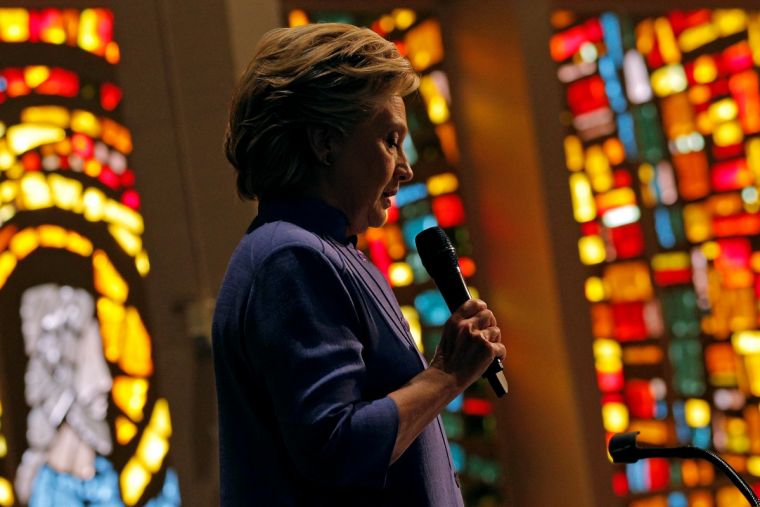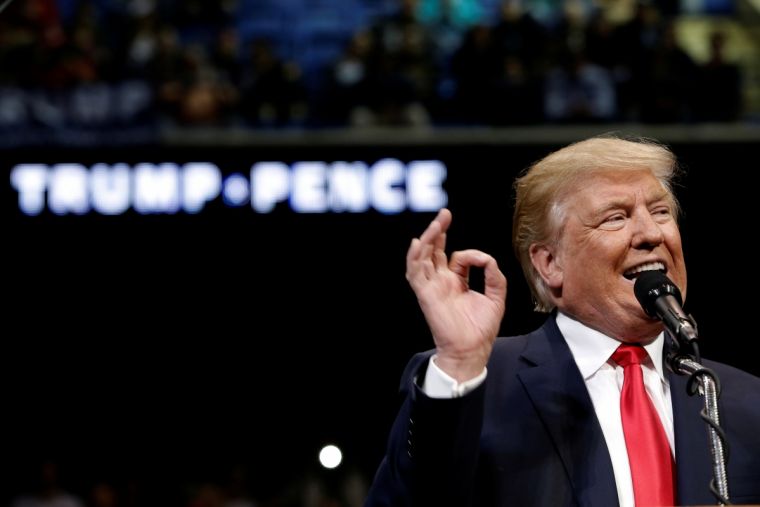What Your Pastor Should Preach On This Sunday

Ahead of the last Sunday before election day, pastor and activist Jim Wallis has called on church leaders to preach the gospel: personally, prophetically and politically.
Wallis, who has made his views on the Republican Presidential nominee quite clear, did not make an emphatic call to endorse one candidate over another. Instead, he called readers to pay attention to "gospel issues", which for him means addressing the deep racial division that currently cuts not only across America, but across the church.
"The big question I am asking is this: Do you believe that racism is an issue that cuts to the heart of the gospel? Are we, as Christians, called to be "ambassadors" for Christ's reconciliation (2 Corinthians 5:20) and does that include racial reconciliation, equity, and healing?
"If your answer to those questions is yes, do you believe that racial bigotry has been spoken, used, fueled, and manipulated in this election? If so, are you willing to speak to that on this last Sunday before this election?"
Racial tensions have been heightened in the last year particularly through highly controversial police shootings, with movements like #BlackLivesMatter highlighting the prevalent injustice and discrimination in America. Such tensions have arguably been stoked further by the rhetoric of Republican nominee Donald Trump, who has repeatedly made inflammatory remarks about ethnic minorities – including derisive comments about Mexicans and a plan to ban all Muslims from the US.
Wallis is clear in his indictment of what the Republican House Speaker called Trump's "textbook racism". So he asks, "Isn't it time for pastors across the political spectrum to say that racism is a gospel issue and oppose that racial bigotry in the public square?"
He goes on to condemn Trump's misogyny, highlighted in a recently revealed Hollywood Access video, in which Trump openly boasts about groping women and trying to seduce a married woman. Wallis asks, "What is your responsibility as pastor when a potential leader of this nation brags about sexually assaulting women, retraumatizing the very women sitting in your pews? These are often taboo subjects in churches – that needs to change."
He goes on to highlight the danger of elevating the issue of abortion and Supreme Court Justices above all others, voting for Trump on the basis of his apparent pro-life stance whilst ignoring every other aspect of his platform. He quotes Russell Moore: "The life issue cannot flourish in a culture of misogyny and sexual degradation. The life issue cannot flourish when you have people calling for the torture and murder of innocent non-combatants. The life issue cannot flourish when you have people who have given up on the idea that character matters. If you lose an election you can live to fight another day and move on, but if you lose an election while giving up your very soul then you have really lost it all..."

Wallis recgnises the reasons that pastors may tend to distance themselves from politics, but insists that "pastors can and should say what we must be 'against' and what we are 'for' for gospel reasons, not political ones."
He calls pastors to highlight Christian values and principles if not naming particular individuals. He urges them to condemn the pervasive racism and bigotry as anathema to gospel truth, and to speak personally about what they themselves will be voting for and against on November 8.
Wallis insists that this is a pastoral duty: "Pastors can speak publicly, act personally, and say what they will do to all the people they influence and need to hear their voice."
A prophetic voice
Wallis's voice on this issue is an important one. It has been said that "When you mix church and politics, you get politics" and there is certainly some truth to that warning. There are many examples of how the tying of religion to a particular party or position has actually been seriously unhelpful and damaging to the witness of the Church. Christians may want to highlight how Christian truth transcends the fierce divides that define much political commotion, and focusses on what is ultimately important.
But firstly, it should be noted that clearly the Church does not transcend human-political arguments and divisions, rather in this election more than ever, it directly conforms to them.
White evangelicals overwhelmingly support Donald Trump, while as Wallis highlights, "in dramatic contrast, based on continuous polling, an overwhelming majority of African-American, Hispanic, and Asian-American Christians will vote against him." Such allegiances highlight how difficult it is for the Church to eschew cultural trends. They also highlight why it is so necessary for pastors to actively speak against those tendencies and promote a different, gospel-centred way of thinking.
Secondly, the divide between Church and State, between politics and the pulpit, is a well meaning but often deeply misleading one. There is wisdom in not turning a church service into a Town Hall debate, and it is possible to disagree on many political issues and still be profoundly united in Jesus. But racism, bigotry and misogyny are not casual 'secondary' issues on which pastors can simply say nothing. These are issues of peace, justice, and true unity, both in the Church and in society at large. God cares about these things, and so should we. The elected President determines decisions on all kind of national issues that will affect real people. He or she also guides the nation as a whole, by their character, their relationships, and their leadership. These things are all essential to the world we live in, and God cares about the world.
There isn't always a clear Christian stance on every issue, but there is definitely a Christian way of thinking, speaking and living together in society. As Wallis says, pastors should speak up not to be partisan, but becasue they care about the people they're called to look after.
We have been granted a "ministry of reconciliation", we should live up to that.











